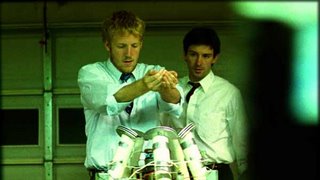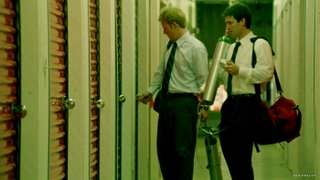
Primer (2004)
Producer/Director/Writer/Star: Shane Carruth
Have you ever seen a grown man gush? I did following the screening of Primer at Roger Ebert’s 2005 Overlooked Film Festival. During the Q&A session with first-time filmmaker Shane Carruth, Ebert said he felt privileged to be in on the beginning of a career he felt was destined to be as great as Martin Scorsese’s. W-O-W. A rightfully humble Carruth seemed bewildered and overwhelmed by this extravagant praise. That made him a lot like Aaron, the character he plays in Primer.
The transformation of Carruth from computer system designer to filmmaker parallels the journey of Aaron and his friend and business partner Abe (David Sullivan) from computer industry workers to inventors of the stuff that dreams (and many movies) have been made on. Abe, Aaron, and two other young men have been working for months on an invention around which they hope to set up their own company and make their fortune. The nature of the invention and the specific skills each man brings to the table are never specified. It's not even clear how they hooked up. We simply enter their lives at what turns out to be a crucial stage.
Money is running short and the partners are starting to disagree about what the next step is. The team seems split into pairs, with Abe and Aaron the more intellectually an
 d emotionally invested of the two pairs. They start working on their own and run a couple of tests. They're not sure whether their machine is doing what it is designed to do, but their measurements seem promising. Curiously, a mossy substance appears on the machine after they run a few cycles. Reminiscent of the accidental way Sir Alexander Fleming discovered a secretion that we now call penicillin, this bit of flora reveals the true nature of Abe and Aaron's invention and alters their lives forever.
d emotionally invested of the two pairs. They start working on their own and run a couple of tests. They're not sure whether their machine is doing what it is designed to do, but their measurements seem promising. Curiously, a mossy substance appears on the machine after they run a few cycles. Reminiscent of the accidental way Sir Alexander Fleming discovered a secretion that we now call penicillin, this bit of flora reveals the true nature of Abe and Aaron's invention and alters their lives forever. After a short bit of soul-searching, Abe and Aaron decide to cut the other two inventors out of their work. They cover over the windows in Aaron's garage/workshop and begin to experiment with their machine, first in predictable ways and then with the growing realization that they are in way over their heads. The characters speak in a shorthand that people who inhabit the same closed universe do, which leaves the audience on the outside a lot of the time. But it also lends the narrative an edgy excitement. What are they doing? What have they discovered? How are they going to deal with the consequences of their discovery?
 Even though this film heads into fantastical territory, it seems so real, grounded as it is in chaos theory, that the suspension of disbelief almost doesn’t enter into the mix. The film is shot in an almost banal, flat way, but at the same time is given a look that seems hyperbolic in its use of color and contrast. There is no color coding, but the beautiful and evocative tinting in every scene puts this film into the landscape of the mind, of dreams. I can only call this near-genius in visualizing the themes of the film.
Even though this film heads into fantastical territory, it seems so real, grounded as it is in chaos theory, that the suspension of disbelief almost doesn’t enter into the mix. The film is shot in an almost banal, flat way, but at the same time is given a look that seems hyperbolic in its use of color and contrast. There is no color coding, but the beautiful and evocative tinting in every scene puts this film into the landscape of the mind, of dreams. I can only call this near-genius in visualizing the themes of the film. Trying to follow the plot gave me a headache (which did not improve on a repeat viewing), but not as much as the one Carruth experienced. He said that he had written and posted elaborate timelines for the story so he could keep each thread straight. The film was rigidly storyboarded to keep it within its austere $7,000 budget. Carruth said that his inspiration for the film was All the President’s Men. The dark-haired Carruth resisted casting Sullivan, who is blond, to avoid making the homage too obvious, but the influence is subtle, in my estimation. Like that film, Primer leaves its main characters breathless at the magnitude of their discovery, and seems to turn a page for the audience in terms of what the future will bring. This is a film respectful of its heritage and bold in its execution. While it seems to follow in the tradition of scrambled narrative popularized by Memento, it stakes out new territory in its examination of ordinary consciousness and goes further to examine the consciousness of the soul. l


0 Comments:
Post a Comment
<< Home